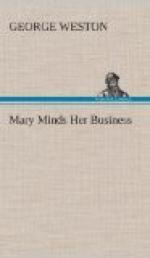“How many have been rejected today?” asked one of the visitors.
“Two,” said the inspector.
These two unfortunates lay on a rack in front of her. Interrupting her work she picked up one of them. At the second operation the pointer turned to a red segment of the dial and a bell rang.
“I don’t hear many bells ringing,” commented the visitor, quizzically looking around the room.
Mary smiled with quiet pleasure.
“Next,” she said, “I’m going to take you to a department where women never worked before.”
She led the way to one of the tempering buildings—a building equipped with long lines of ovens—each as large as a baker’s oven—where metal cones were heated instead of rolls.
“Here, too, as you will see,” said Mary, “we have tried to reduce the element of human error as far as possible. In each oven is an electric thermometer and when the bearings have reached the proper degree of heat, an incandescent bulb is automatically lighted in front of the oven.... See?”
They made their way to the oven where a white light had appeared. A woman-worker had already opened the door and was pulling a lever. As though by magic, a bunch of castings, wired together, came travelling out of their heat bath and were immediately lowered into a large tank which held the tempering liquid.
“What would have happened if the oven hadn’t been opened when the white light appeared?” asked another of the visitors.
“In five minutes a red lamp would have been automatically lighted,” said Mary “—a signal for the forewoman to come and take charge of the oven.”
“And suppose the red lamp had been disregarded?”
“In five minutes more an alarm bell would have started. You would have heard it over half the factory—and it would have kept ringing until the superintendent herself had come and stopped it with a key which only she is allowed to carry.”
“Is that the bell now?” he asked, as a mellow chime came from one of the distant buildings.
“No,” smiled Mary, listening, “that’s the lunch bell. In another ten minutes I shall have a surprise for you.”
At the end of that time, they made their way to the dining room, which was already filled with eager women. In one corner was a private room, glass-partitioned. As Mary followed her guests toward it, the full, subdued strains of the Crusader March suddenly sounded in harmonious greeting from the other end of the room.
“Ah!” said the most distinguished visitor, turning to look. “Men at last!”
Mary let him look and then she beamed with pleasure at his glance of appreciation.
“Our own orchestra—one hundred pieces,” she said. “This is their first public appearance.”
Oh, but it was a red-letter day for Mary!
Whether it was the way she felt, or because the sound became softened and mellowed in travelling the length of the dining room, it seemed to her that she had never heard music so sweet, had never listened to sounds that filled her heart so full or lifted her thoughts so high.




